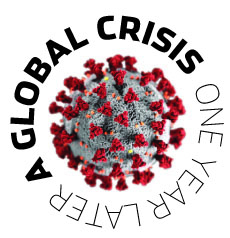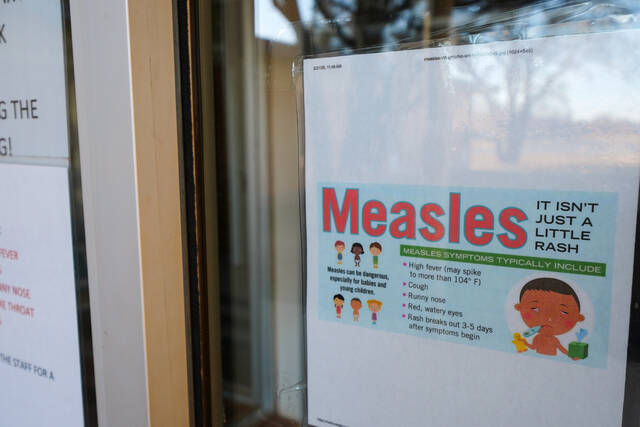Nobody could blame Dr. Amesh Adalja if he feels somewhat reluctant to check his email or go to the mailbox on certain days.
The Pittsburgh-based infectious disease expert, who is of Indian descent, has been on the receiving end of everything from overtly racist emails, including being called “dirt skin,” to receiving a package of rotten meat.
Adalja, a Butler native and senior scholar at the Johns Hopkins Center for Health Security, has emerged as one of the most recognizable national experts on the pandemic. Since Americans first began hearing about coronavirus a year ago, Adalja has become a go-to guy for much of the national media, appearing regularly on CNN, MSNBC and Fox as well as showing up on CBS, NPR and in The New York Times among many other outlets, including the Tribune-Review.
Adalja, 45, enjoys the exposure and has a devoted following. But he’s aware that with exposure comes criticism.
When President Trump was ill with covid-19 in the fall, Adalja received a lot of flak for saying in a television interview that “we’ve got to wait a couple days to know how well he’s going to do because there is a critical period for somebody with high-risk factors.”

To Adalja, it was simply an honest assessment of the situation the president was in. Some viewers, however, didn’t want to hear it.
“Being in the press all the time, I get lots of hate mail,” Adalja said. “Anytime I say something that might not necessarily be what people want to hear, it generates a lot of hate mail, lots of four-letter words in emails to me.”
Adalja takes it in stride, accepting the barbs while keeping in mind what his childhood hero, the French microbiologist and chemist Louis Pasteur, endured a century-and-a-half ago. At first, Pasteur was dismissed as a quack but was eventually renowned for his discoveries of the principles of vaccination, microbial fermentation and pasteurization.
“Did I ever feel like Louis Pasteur? Yeah,” said Adalja, reluctant to put himself in the same category as the man he idolizes. “Pasteur was ridiculed, and he proved them all wrong in the end when he called the press and demonstrated that the anthrax vaccine worked.
“When you’re in the field of pandemic preparedness, when you deal with catastrophic infectious disease, you’re thinking about things that most people believe are not likely to happen. And people think you’re specializing in something that’s so esoteric and odd and such a niche that they think you’re just that weird infectious disease guy. But (studying infectious disease) is what I liked.”
Those who know him say his chosen field of practice is a natural fit.
“The whole time that I’ve known him, the books that he reads, and he’s even given me some of them, were all books about either the history of infectious disease or people that made important discoveries in the history of infectious disease,” said Dr. Karin Byers, clinical director of infectious disease at UPMC and someone Adalja cites as instrumental in the development of his career. “This is something that’s a lifelong love for him.”
Adalja’s path to medicine and becoming an infectious disease doctor was an unusual one.
His family moved to Butler from Philadelphia when he was 1. Adalja had what he describes as a “prototypical” Butler upbringing, attending grade school at Butler Catholic before graduating from Butler High School in 1993.
His mother, Dr. Varsha Mehta, and father, Dr. Ashok Adalja, are both physicians and immigrants from India. Even as a child he was interested in medicine and infectious disease. But in addition to Pasteur, his heroes were professional skateboarders.
“That was kind of my whole existence. It was geared around skateboarding. My friends were skateboarders, and I made a skateboarding magazine for the town when I was in high school,” Adalja said. He also wrote lots of letters and has autographed pictures of “every professional skateboarder from the 1980s that you can think of.”
Adalja even entered a few contests as a teenager. But any dreams he had of succeeding Tony Hawk as the next skateboarding legend were dashed by a devastating injury. He broke his ankle at 17 in a skateboarding accident and needed multiple surgeries. However, he still keeps a skateboard in the trunk of his car and uses it on those rare occasions when he has a chance to unwind.
A driven student, Adalja left Butler High with college credits from AP classes and enrolled at Carnegie Mellon University, taking an advanced course load and graduating at 19 with a degree in industrial management. He took a finance job in New York City. But he was bored and found himself getting drawn back into medicine. He bought a book called “Level 4: Virus Hunters of the CDC” by Joseph McCormick and loved the detective work involved. At that point, he knew where his life was headed.
He came home and told his parents what he wanted to do. Adalja applied to the University of Pittsburgh School of Medicine but wasn’t accepted. It was a setback he hadn’t anticipated but understood.
“Graduating college at age 19 gets you some C’s on your transcript, which probably aren’t the best things to have when you’re applying to medical school,” he explained. “So, I was scrambling and I applied to other places and it was all not very good.”
Undaunted, he ended up being accepted at the American University of the Caribbean School of Medicine in St. Maarten, graduating in 2002. From there, it was on to a residency at Allegheny General Hospital, where Adalja impressed those he worked with. He worked at UPMC from 2007 to 2017.
“I was supposed to be supervising him, and his knowledge was already outstanding. He was like having another attending physician around,” said Dr. David Rottinghaus, who worked in the Emergency Department at AGH when Adalja arrived and is now chief medical officer for the Butler Health System.
“What you see with Amesh is this incredibly driven, highly intellectual, great thinker and no doubt someone that was at the top of their academic performance in class every step of the way. When you get to know him, you see that deep care and that deep desire to do what is right. He cares about truth and community.”
Adalja’s passion for doing what is right sometimes leaves him exasperated when he sees political leaders botching things, like the handling of the pandemic in its early stages. There are plenty of video clips going back to January and February 2020 of Adalja giving prescient advice that largely went ignored and has left him seething.
“I could not imagine for the life of me how badly this could be managed in the United States. The U.S. could have been Taiwan here. Taiwan had eight people die,” Adalja said.
Nevertheless, throughout the pandemic, Adalja has persevered, rarely, if ever, turning down an interview. As he was speaking to one reporter around 10:30 a.m. Monday last week, he also was fielding requests and preparing for interviews with Yahoo TV at 11:20, NPR at noon, MSNBC at 1 p.m. and whatever else was coming his way.
The folks at Johns Hopkins estimate Adalja has done tens of thousands of interviews on various infectious diseases over the years. But he’s not complaining.
“I worked my entire career to be in this type of position,” he said. “When covid-19 occurred, it took me to a different level in my career that I didn’t even know existed. When you’re somebody that specializes in something that becomes the biggest thing in the world, I’d like to think that I’ve risen to the occasion as best as I can. I’ve tried to be a resource to the world and explain something that’s ever changing and very complicated.”
And he wouldn’t be getting invited back for interviews if he wasn’t good at them.
“I think he’s able to provide information in a way that’s coherent and acceptable to a large number of people, which I think is important,” Byers said. “You can be brilliant and have a lot of information at your fingertips but not be able to make it understandable to the people that need to know about it. I think he does that well.”
But, for Adalja, it’s not just about media appearances and speaking engagements. He also walks the walk, continuing to work at Butler Health System and Pittsburgh-area hospitals, commuting from his home in Pittsburgh’s South Side Slopes.
Adalja is board certified in four specialties — emergency medicine, internal medicine, critical care and infectious disease. “That is incredibly rare, and at Butler Memorial Hospital he will cover our intensive care unit,” Rottinghaus said. “He typically spends a few days a month in our emergency department pulling shifts alongside of our docs, and he will also cover the infectious disease service from time to time as well.”
He said it’s important that he keep his clinical skills relevant.
“I’ll be working the night shift tonight,” he said on Monday of last week. “And I worked this whole weekend clinically, just trying to make sure that I have the best of both worlds. I think that’s also something the media appreciates because I can not only talk about government policy or what’s going on in some other country, but I can also say, ‘This is what’s going on in the hospital I was at yesterday.’ ”
Adalja, who is single, admits the intense schedule takes a toll and that he’s feeling more fatigued than usual.
“It’s difficult to fathom but I love this field, and this is what I spend all my time thinking about and living and breathing so I’m not going to complain about this. Because this is what I signed up for — to be an infectious disease doctor that works on pandemics — and your expertise can help people get through it,” Adalja said.
“The value I provide is worth whatever fatigue I have. When the pandemic is over, then I’ll realize how much I’ve been through.”













